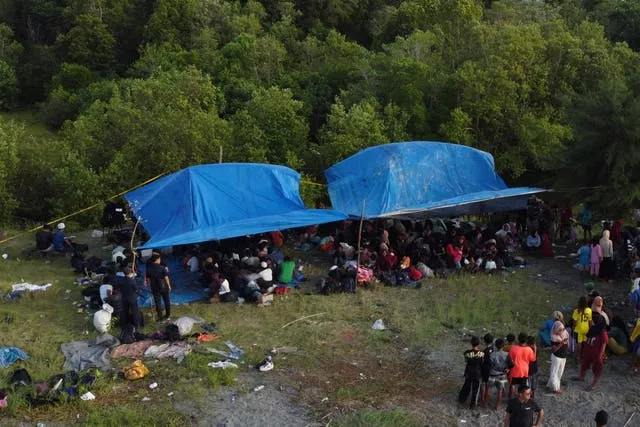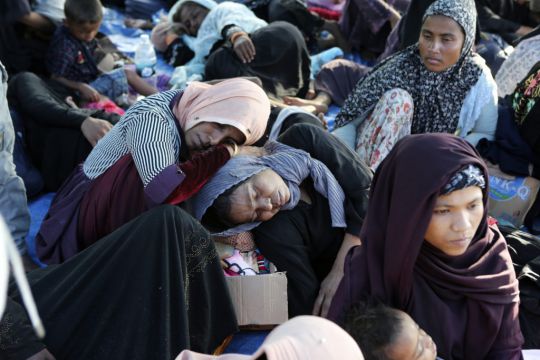Nearly 150 Rohingya refugees, mostly hungry and weak women and children, have reached a beach in Indonesia’s North Sumatra province after weeks at sea, officials said on Sunday.
The group of 53 men, 39 women and 55 children arrived on Karang Gadih beach in Langkat district late on Saturday, said the village head, Muhammad Amiruddin.
A rickety, leaky wooden boat that brought them from Bangladesh was moored on a lighthouse island not far from the village, he said.
Five among the refugees were sick after the long journey and residents gave them food and water while they waited for instructions from immigration and local officials to decide where to take them.
Residents do not want the refugees in their communities, however, and last week many protested over the recent Rohingya arrivals.
“We helped them as they look very weak from hunger and dehydration,” Mr Amiruddin said. “But many residents cannot accept them to live in our village because they will only bring problems later.”
He said one of the refugees told authorities they had been sailing from the Cox Bazar refugee camp in Bangladesh to Indonesia when they became stranded on a lighthouse island.

About 740,000 Rohingya were resettled in Bangladesh after fleeing their homes in Myanmar to escape a brutal counter-insurgency campaign by security forces. But the camps in Bangladesh are squalid, with surging gang violence and rampant hunger, leading many to flee again.
On Wednesday, a mob of students attacked the basement of a local community hall in Banda Aceh, the capital of Aceh province, where 137 Rohingya were taking shelter.
The incident drew an outcry from human rights groups and the UN refugee agency, which said the attack left the refugees shocked and traumatised.
Indonesia’s navy said on Thursday that it forcibly pushed a boat packed with refugees back to international waters after the vessel approached the shores of Aceh province a day earlier.
It was unclear whether the refugees who arrived in neighbouring North Sumatra province late on Saturday were from the same boat.
Indonesia has appealed to the international community for help and intensified patrols of its waters due to a sharp rise in Rohingya refugees leaving overcrowded camps in Bangladesh since November. More than 1,500 Rohingya have arrived in Aceh and faced some hostility from fellow Muslims.
Indonesia, like Thailand and Malaysia, is not a signatory to the United Nations’ 1951 Refugee Convention so is not obligated to accept the Rohingya. So far, refugees in distress have received at least temporary accommodation.
Muslims comprise nearly 90% of Indonesia’s 277 million people, and Indonesia once tolerated such landings, while Thailand and Malaysia pushed refugee boats away. But there has been a surge of anti-Rohingya sentiment this year, especially in Aceh, where residents accuse the Rohingya of poor behaviour and creating a burden.
The growing hostility of some Indonesians toward the Rohingya has put pressure on President Joko Widodo’s government to take action.







